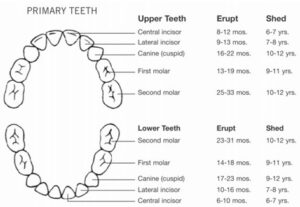- Age is a factor
Don’t worry if your baby is not developing any tooth sooner or if your baby has milk teeth very sooner then expected. In both cases in depends upon the dental age of an individual and so your child. Mostly the first baby tooth develops between initial 6 to 12 months, but that said there is also sometime presence of teeth when you see your baby for the first time!! Yes, some babies are born with the presence of teeth in their mouth. Now mostly the first teeth to arrive are lower front teeth, and you can expect all the milk teeth to arrive by the age of around 3 years, but as previously stated there can be delay or early eruption.

- Fluoride plays a Key Role
Fluoride when added in moderation to child’s diet can be a boon for his/her teeth as it helps in mineralization of teeth. It basically prevents decay of your child’s teeth by depositing minerals in the enamel and subsequently hardening the same. Fluoride is often added to drinking water.
- What to do in teething
Teething is a condition in which child becomes excessively irritated and frustrated due to fever which can be triggered by the erupting teeth. So you should never give something which contains chemical to put in your baby’s mouth to calm him/her down. You should always have apt knowledge of the thing your child has in his/her mouth.dont apply gels that contain chemicals such as benzocaine which numbs your child’s gums or products containing belladonna which is a type of plant poison. Companies market them as it will help to numb your child’s gums but it contains chemicals which are banned by FDA.
- Steps to follow for Teething.
Having said what all to avoid now you must be thinking what to actually do to get relief from the pain and irritation your child is suffering when his/her teeth are erupting. Usually teeth is not that of a discomfort to a child as thought by the parents, but yes definitely the local area where tooth is coming do tend to become swollen and tender and considering the tolerance level of an infant that may sometime prove to be worse, but most of the time it may well be managed by the home remedies like massaging sore and tender gums, offering the child something cold, or a very mild dosage of painkiller on a very painful night. Parent’s alongwith massaging with their clean fingers can offer teething rings which are solid in nature instead of liquid filled teething rings. A child’s temperature may also rise during teething and this feverish condition is not to be confused with actual fever associated with illness, this is very mild and transient temperature which can be easily controlled with weight modulated acetaminophen dosage. Many children will also not feel a thing when their teeth come in.
- Brushing is equally important
When your baby’s first teeth have erupted you should without a delay start the practice of brushing their teeth with immediate effect with fluoridated toothpaste roughly about the size of a grain on soft bristles toothbrush twice a day. Also never ever allow your child to go to sleep with milk bottle in his/her mouth, which can turn detrimental for your baby’s teeth.
- Plan your Dental Visit
Soon after the first set of teeth is evident in your child’s mouth you can plan your dental visit. Your dentist will ensure everything is normal and if not can suggest you with the best things to take care for your child’s oral health.
